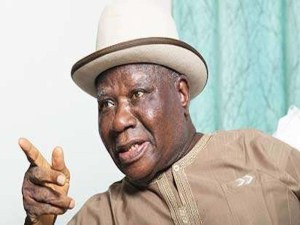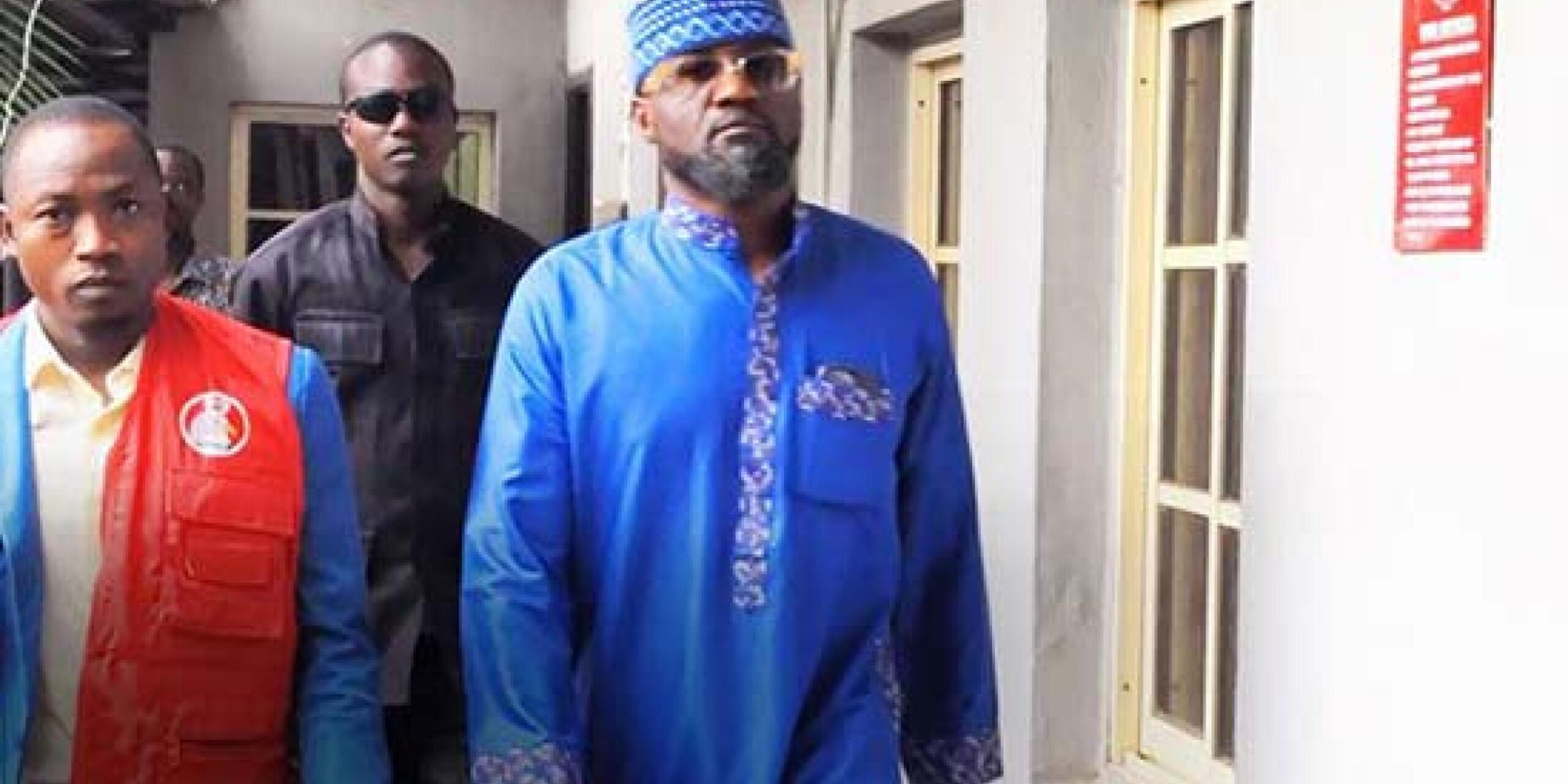 Resurgence of hostilities in the Niger Delta became palpable Monday as the Pan Niger Delta Forum (PANDEF), a coalition of elders and leaders of the region, asked the federal government to meet its 16-point agenda by November 1, 2017, or risk its withdrawal from ongoing negotiations that had calmed nerves in the oil-rich zone in the last one year.
Resurgence of hostilities in the Niger Delta became palpable Monday as the Pan Niger Delta Forum (PANDEF), a coalition of elders and leaders of the region, asked the federal government to meet its 16-point agenda by November 1, 2017, or risk its withdrawal from ongoing negotiations that had calmed nerves in the oil-rich zone in the last one year.
The forum also expressed regrets over the National Assembly’s rejection of the constitution amendment bill on the devolution of powers from the federal government to the states, saying it was antagonistic to the interest of the Niger Delta.
The Niger Delta leaders spoke at a press conference addressed by the forum’s National Leader/Convener, Chief Edwin Clark, in Abuja where they added that the killing of the bill had reduced the possibility of restructuring the country along fiscal federal lines that could eliminate the persistence of tension and strife that had bedevilled the country for a long time.
The forum said in the circumstances, it would have to insist that the federal government returned to the table with it to trash out the outstanding issues arising from the need to implement its 16-point demand for the development of the region.
Already, a militant group, the Niger Delta Revolutionary Crusaders (NDRC), has threatened to resume attacks on oil facilities on September 31, 2017. The group, in a statement Monday by its spokesman, Mr. Izon Ebi, also urged PANDEF to stop all talks with the federal government.
“We have resolved and are more determined to use all necessary means to take back our heritage by stopping all oil and gas exploration and exportation in Niger Delta come September 31, 2017. And when that time comes, heaven will not fall,” it said.
It added: “We have resolved that resource control, fiscal federalism and devolution of powers are the only panacea. Anything short of that will not be acceptable to NDRC and the 21st-century agitators of the Niger Delta.
“Our elders and distinguished personalities of PANDEF have tried in their advocacy. We realise that the balancing act of being elder statesmen and resource control advocates can be a very touchy act. That is why our goal is in consonance with the vision of Niger Delta’s emerging youth leaders in the clamour for resource control,” the group stated.
Following the resurgence of militancy in the region, spearheaded by the Niger Delta Avengers and a couple of other militant groups, the federal government set up a committee under the leadership of the National Security Adviser (NSA), Maj-Gen Babagana Monguno, to reach out to the region’s leaders and seek peace.
Coordinated by the Minister of State for Petroleum, Dr. Ibe Kachikwu, the committee reached out to the region’s elders and leaders massed in PANDEF, who eventually reined in the youths that had taken up arms and had inflicted so much damage to the oil industry’s capacity to meet Nigeria’s quota for crude exports.
PANDEF’s intervention enabled the visit of Acting President Yemi Osinbajo to the region where he was presented with the 16-point demand as the basis for peace. The acting president who went to the region on the instruction of President Muhammadu Buhari promised that the federal government would act on the demands.
With the promise, calm returned to the region to the relief of a nation that had slipped into economic recession partly due to the militants’ activities in the oil-rich zone. This enabled the federal government to fix the damaged pipelines and hinged closer to its crude export quota, helping the country to move towards economic recovery.
Niger Delta leaders said Monday that the federal government might have taken their understanding for granted as it had failed to fulfil its promise to respond to the region’s demands for development.
Clark noted that despite the assurances of the Buhari administration to address the agitations of the people of the Niger Delta, the government had refused to take any visible steps.
This, he said was in spite of efforts by PANDEF to calm restiveness in the region and help to stabilise oil production, thus assisting the country to get out of recession.
He said: “I wish to urge the federal government to, as a matter of urgency, implement the pronouncements made by the Acting President, His Excellency, Professor Yemi Osinbajo, SAN, GCON, during his fact-finding visits to the Niger Delta region, and to set up, without delay, the federal government dialogue team to engage PANDEF towards resolving the pending issues contained in the forum’s 16-point demands on behalf of the people of the Niger Delta region, by, or before, November 1, 2017 (one year anniversary of our meeting with His Excellency, President Muhammadu Buhari),”
He said the endurance of the people was not inelastic and that should their patience snap, no one could predict the outcome.
He added: “We submitted a 16-point demand to Mr. President on November 1, 2016, and we had expected that by its next anniversary, the 16-point agenda would have been comprehensively sorted out,” warning: “If at the expiration of November 1, 2017, ultimatum, the federal government either fails or refuses to accede to these lawful and legitimate demands of the Niger Delta people, PANDEF may consider pulling out of the ongoing peace process in the Niger Delta.”
He complained about the alienation of the people of the Niger Delta, citing appointments at the Nigerian National Petroleum Corporation (NNPC) and discrimination against indigenes of host communities in the area of indigenous oil and gas concessions.
The forum also rejected the decision of the National Assembly to kill the bill on the devolution of powers with Clark lamenting that the word restructuring was painful to the champions of a bad hegemony, and called for a return to the 1960 Constitution.
He said: “Suddenly, the word ‘Restructuring’ has become a pain in the ears of a few champions of wicked hegemony. All we are saying is, let us go back to the negotiated 1960 Independence Constitution, on which the 1963 Republican Constitution was moulded. If there be anything wrong with that Constitution, it can become an issue to ameliorate, by amicable negotiations and consensus.
“Anything else is most obnoxious and totally unacceptable to the people of the entire Southern and Middle Belt areas of Nigeria, as well as the growing numbers of well-meaning Nigerians from the Northern parts of the country. All we are saying is, ‘No Restructuring, no Nigeria.”
Flanked by several members of PANDEF, including King Alfred Diete-Spiff, Senator Stella Omu, Senator Henshaw and Mr. Kayode Ajulo, Clark stated that the demand for restructuring did not mean the people of the region did not believe in the corporate existence of Nigeria.
According to him, “You can therefore understand why some Northern elements are constantly opposed to any increase in the derivation formula of 13 per cent under Section 162 of the 1999 Constitution (as amended) during the Political Reform Conference of 2005, and also the National Conference in 2014, where the Northern delegates vigorously opposed any increase in the derivation provision, and this was responsible for our staging a walk-out from the Conference.
“It is on record that, during the 2014 National Conference, prominent Northern delegates, again, opposed the increase of derivation revenue from 13 per cent to 25 per cent. But the conference eventually recommended 18 per cent derivation revenue for oil producing states, and also recommended five per cent for rebuilding the North-east that has been devastated by the insurgent activities.
“Some Northern delegates were opposed to it because Kano and Kaduna were not included.”
Ekweremadu Urges Restraint
Meanwhile, the Deputy Senate President Ike Ekweremadu has said the rejected bills proposing certain amendments to the 1999 Constitution could still be revisited, following further consultations and understanding of the issues.
This is as he reiterated that devolution of more powers to the states from the Exclusive List, would accelerate infrastructure development.
Ekweremadu said these during a consultative meeting on South-east infrastructural development with a delegation of the Partnership to Engage, Reform, and Learn (PERL) and the United Kingdom’s Department for International Development (DfID) led by PERL’s Team Leader, Dr. Adiya Ode, in Abuja recently.
Details of the meeting were made available by his Special Adviser, Media, Mr. Uche Anichukwu.
Ekweremadu’s position echoed that of Senate President Bukola Saraki who recently stated that the National Assembly had not yet foreclosed some constitution amendment bills that were not approved by the federal legislature.
Ekweremadu, who is the Chairman of the Joint Committee on the Review of the 1999 Constitution, however, commended his colleagues for ensuring that 95 per cent of the alteration bills scaled through.
“We are also conscious of the fact that Nigerians are worried about some of the recommendations that did not pass. Let me use this opportunity to further appreciate and reassure Nigerians that we are sensitive to their feelings and that we are likely going to revisit some of the issues they are concerned about when we return from our vacation.
“Some of the issues did not scale through because there is the need for fuller understanding as well as more consultations and consensus building on them and their implications for our people,” he said.
Speaking on the devolution of powers, Ekweremadu said the South-east region has serious infrastructure deficiency.
“No doubt, your studies on South-east were right because the region is indeed highly challenged, especially in the areas of transport infrastructure such as roads, railway, seaport. We are also challenged in the areas of power.
“That is why we in the Committee on Constitution Review believe we mean well when we talk about things like devolution of powers. Our view is that some of these things should be moved from the Exclusive List to the Concurrent List so that while the federal government is making efforts, the states too will be making efforts either individually or in clusters or partnership with one another.
“That was why we took things like power to the Concurrent List so that states can generate power, transmit, and distribute power. The same goes for the railway, which is still the exclusive preserve of the federal government. That way, Nigeria can effectively speed up socio-economic development in all parts of the country.
“Unfortunately, some of these issues were misunderstood. But it is not the end of the road. We believe that with more engagements, the issues will be better appreciated and we are positive about more favourable dispositions when we revisit them. As leaders, we all have our eyes on the future and are committed to building a better Nigeria for posterity,” he said.
Speaking earlier, Ode commended the National Assembly for voting in favour of autonomy for local governments and state Houses of Assembly, while also calling for greater support for gender mainstreaming and other amendments that would speed up national development.
She disclosed that PERL and DfID were currently working to address infrastructural deficits that impede the business environment in the South-east and sought the support of the Deputy President of the Senate towards convening political leaders of the region to discuss issues that would aid the development of the region.
Credit:  ThisDay
ThisDay







